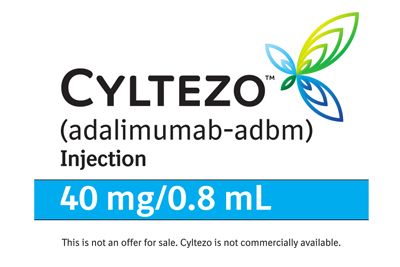- Bone Health
- Immunology
- Hematology
- Respiratory
- Dermatology
- Diabetes
- Gastroenterology
- Neurology
- Oncology
- Ophthalmology
- Rare Disease
- Rheumatology
Cyltezo Is a Contender for First Interchangeable to Humira, Boehringer Ingelheim Says
The results of Voltaire-X could persuade the FDA to authorize automatic substitution of the adalimumab biosimilar Cyltezo for its reference product (Humira), investigators believe.
Boehringer Ingelheim believes it is on its way toward gaining perhaps the first interchangeable designation for a biosimilar, based on results of VOLTAIRE-X, a phase 3 randomized study that compared pharmacokinetic properties for the adalimumab reference product (Humira, RP; 40 mg/0.8 mL) with those of the adalimumab biosimilar Cyltezo (BI 695501) in patients with moderate-to-severe chronic plaque psoriasis.
Patients received RP continuously or switched between the biosimilar and RP, and investigators concluded that patients who were switched multiple times between RP and Cyltezo experienced similar clinical outcomes in terms of pharmacokinetics, efficacy, immunogenicity, and safety.
“This study is, to our knowledge, the first to report outcomes that meet the US FDA’s criteria for interchangeable biologic designation,” investigators stated in findings presented at the American Academy of Dermatology 2021 virtual meeting this month.
There are 29 FDA approved biosimilars but none of them has an interchangeable designation, meaning that, depending on individual state laws, pharmacists could fill prescriptions with biosimilars rather than the originator product without approval from the prescribing physician. It is generally assumed that the lack of interchangeable designations is a chief impediment to patient and physician confidence in biosimilars, which are FDA approved as being “highly similar” to originator brands, and just as safe and efficacious, with no clinically meaningful differences.
For an interchangeable designation from the FDA, a biosimilar is “expected to produce the same clinical result as the reference product in any given patient” and “not present greater risks in terms of safety or diminished efficacy from alternating or switching between the interchangeable candidate and reference product,” Boehringer Ingelheim noted, quoting from FDA guidelines.
Cyltezo was approved in 2017 and is scheduled for launch on July 1, 2023, based on a settlement with AbbVie. Boehringer Ingelheim anticipates an FDA decision on the application for interchangeability in the fourth quarter of 2021.
Study Findings
In VOLTAIRE-X, investigators evaluated area under the curve (AUC), or drug concentration over time in the bloodstream; Cmax, or peak concentration after administration of the first dose; presence of anti-drug antibodies (ADAs), a measure of immunogenicity and the body’s response to adalimumab; and presence of neutralizing antibodies (nAbs), which can diminish or boost biosimilar effectiveness.
They randomized 238 patients to the switching (n = 118) or continuous treatment (n = 120) arms. In the switching and continuous treatment cohorts, the adjusted mean AUC was 2025.83 μg.h/mL vs 1925.90 μg.h/mL, respectively (ratio of adjusted means, 105.19%; 90.2% CI, 96.58-114.64).
Adjusted mean Cmax was 7.08 μg.h/mL and 7.00 μg.h/mL in the switching and continuous arms, respectively (ratio of adjusted means, 101.14%; 90.2% CI, 93.26-109.70). Investigators concluded the 90.2% CIs for AUC and Cmax were within the acceptable bioequivalence boundaries of 80% to 125%.
In the evaluation for immunogenicity, investigators found that at week 32 similar proportions of patients had developed ADAs in the switching vs continuous treatment arms (90.2% vs 94.5%, respectively), and nAb results were similar also between the 2 arms (41.1% and 41.8%, respectively).
In the switching vs continuous treatment arms, the proportions of patients who achieved a psoriasis area and severity index (PASI) score of 75 (75% or better showing improvement over baseline PASI scores) were also similar: 84.7% vs 79.0%, respectively (90% CI, –2.45%-13.96%).
The proportions of patients with physician global assessment (PGA) scores ≤1 at week 32 were also similar between the switching and continuous treatment arms: 70.3% vs 64.7%. The PGA is 5- to 6-point measure for disease severity.
On safety, investigators noted that following randomization, the percentages of patients who experienced at least 1 treatment emergent adverse event (TEAE) were similar in both arms (56.8% and 62.5%, respectively). A slightly higher percentage of patients experienced drug-related TEAEs in the continuous treatment arm (18.3% vs 11.9%).
Reference
Menter A, McCabe D, Lang B, et al. Phase III, randomized trial comparing clinical outcomes between patients with moderate-to-severe chronic plaque psoriasis receiving adalimumab reference product continuously versus those who switched between BI 695501 and adalimumab RP. Presented at: American Academy of Dermatology 2021; April 23-25, 2021.
Newsletter
Where clinical, regulatory, and economic perspectives converge—sign up for Center for Biosimilars® emails to get expert insights on emerging treatment paradigms, biosimilar policy, and real-world outcomes that shape patient care.

